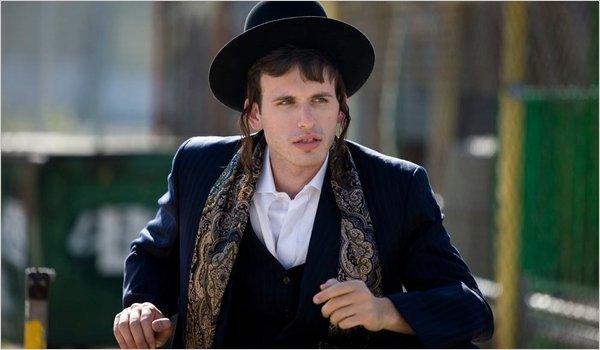

By Kim Voynar Voynar@moviecitynews.com
Review: Romeo and Juliet in Yiddish
Romeo and Juliet in Yiddish feels like it wants to be a big, sprawling, artistic statement on art and religion and big life lessons and the chasms that divide us. Unfortunately, while it’s certainly sprawling, it’s also often unruly and chaotic and all over the place, keeping itself from being as profound as it aspires to be by tripping over its own ambitions. I found myself frustrated frequently by writer-director-actor Eve Annenberg’s frenetic approach to integrating classic Shakespeare and Orthodox Judaism with a tale of midlife crisis and faith, even though at times the very things that I found most exasperating were also kind of charming, in their way.
Our star-crossed lovers here are represented by Lazer/Romeo (Lazwer Weiss) and Juliet (Melissa Weisz), young people from rival Hasidic groups, with the Satmar and Lubavitch denominations subbing in for Montagues and Capulets. Even if you don’t know anything about Orthodox Judaism or Williamsburg, Brooklyn, Shakespeare’s tale of love amid feuding would seem to be an interesting basis for exploring the ideas of isolation, rule-breaking and consequence in which Attenberg seems to be interested. But rather than simply taking Shakespeare’s classic tale and adapting it to a story about outcast Jews and rival denominations and playing up the universality of the ways in which we humans stratify ourselves within culture and subculture, Annenberg adds in this second layer of story in which a disgruntled, sarcastic ER nurse/literature grad student, Ava (played by Attenberg), is assigned to modernize an old Yiddish translation of Shakespeare’s play, and further complicates Ava’s storyline by adding in a Kabbalah-studying houseguest who keeps leaking magic and talking like he’s tripping on ‘shrooms. Ava enlists the help of the three young outcast Orthodox Jews Lazer, Bubbles (Bubbles Yoeli Weiss) and Mendy (Mendy Zafir) — also respectively Romeo, Mercutio and Benvolio in intercut scenes re-enacting Romeo and Juliet which re-imagined in urban settings … and in Yiddish, and real life starts to merge into play and fantasy as our characters explore new ideas through Shakespeare.
It all sounds great on paper. Unfortunately, the time is spent on Ava’s arc took away from the more interesting story about these three young outcast Jews trying to simultaneously break away from their restrictive upbringing, while keeping a foot in both worlds, as represented by Lazer’s pursuit of a young woman forbidden to him not only by being from a rival denomination, but also by his choice to leave the community and become an outcast, and how they deal with all that. The leaking magic keeps things unpredictable and chaotic, but does little to help us understand (or care) why Lazer, Mendy and Bubbles chose to become outcasts, or what their goals are other than slacking, smoking and doing drugs.
Consequently, almost everyone, in spite of abundant individual charms, ends up feeling more like surface caricatures than full-fledged characters. The story ends up revolving more around Ava, and the need for her to come to terms with her own life choices, isolation from the community in which she was raised, and the reason behind her prickles and barbs, and it felt like this much more personal angle is perhaps what Attenberg started out wanting to explore. Not that it’s not a valid choice for this to really be Ava’s story/Attenberg’s exploration of secular versus Orthodox Judaism, but for me it made the whole Romeo and Juliet angle feel more like a clever conceit wrapped around the story the writer-director really wanted to tell, rather than a greater exploration of Shakesperean theme and Jewish subculture, and I’d have rather had just one focus or the other, fully developed, instead of this overly ambitious attempt to intertwine the two.
Some positive notes: Romeo and Juliet in Yiddish did retain my attention most of the time and kept me interested in seeing where it was going, and while Attenberg’s ambitions sometimes exceed her ability to knit everything together succinctly, there are clever bits here and there with the way the film is edited and shot. Visually, some of the scenes are lovely and there’s a bit of a fairy-tale feel to this film that sets it apart from the pack. This film’s greatest strengths lie in the charm and energy of the cast and in the compelling idea of melding Shakespeare with Orthodox Judaism. I wish, though that those strengths didn’t get so bogged down in the ambition for this film to be “more,” to the extent that the overall impact ends up being less.















